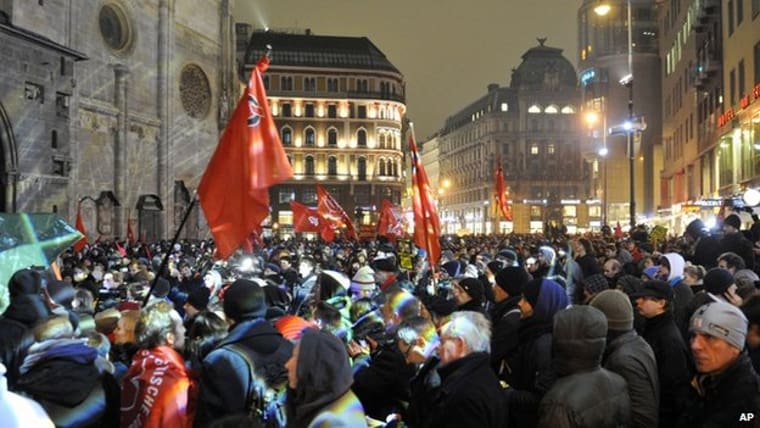Transcribed from the 11 February 2017 episode of This is Hell! Radio (Chicago) and printed with permission. Edited for space and readability. Listen to the whole interview:
We have catastrophically neglected important emotions: the search for dignity, the search for honor, the search for solidarity. When people lose their jobs, they not only lose a source of income, they lose their identity. They lose their faith in the wider community. These are devastating psychological shocks. The left has not really been cognizant of these problems.
Chuck Mertz: Many are still trying to figure out what the hell happened in the US presidential election last November. On the other side of the Atlantic, they’re still trying to figure out how Brexit happened. But it may be a lot more clear to us what is happening in politics around the globe when we realize we are no longer living in an age of reason, but an age of anger.
Here to explain, award-winning writer Pankaj Mishra is the author of Age of Anger: A History of the Present. Last month, Pankaj also posted the Guardian article “Welcome to the Age of Anger,” and his latest book prior to Age of Anger was 2013’s From the Ruins of Empire: The Revolt Against the West and the Remaking of Asia.
Welcome to This is Hell!, Pankaj.
Pankaj Mishra: Thank you.
CM: Great to have you on the show.
You write, “The election of Donald Trump as president of the United States has fully revealed an enormous pent-up anger which had first become visible in the mass acclaim in Russia and Turkey for pitiless despots and the electoral triumph of bloody strongmen in India and the Philippines.”
Is this a popular uprising, or is power simply being taken by strongmen? After all, here in the States Trump did not win the popular vote, and there are many reports of voter suppression. There were allegations in 2007 of the Russian elections being biased towards Putin, and then again in 2012 when there were allegations of fraud. Indian elections are regularly clouded with corruption and unfairness. Turkey’s 2015 election had allegations of unfairness. The Philippines has a strongman in Duterte, who has killed thousands (apparently with Donald Trump’s vocal support, according to reports of a phonecall between the two in December).
So are these strongmen coming to power with or without public support?
PM: They’re coming to power with a lot of public support, and I think it would be a mistake to look at isolated instances of electoral failures or people not being allowed to vote and to conclude from that that these people are simply deploying fraud in order to get elected.
I’m glad you began your introduction with reference to various other incarnations of Donald Trump around the world which preceded him; it’s really important to take that into account. I don’t think this is emphasized enough in the current discourse. People like Putin and Modi had been rising to power on a wave of great public disaffection for a while, and they have been in power for some time now, and Donald Trump is simply the culmination of a worldwide tendency to elect strongmen, to look to strongmen who can cut through the processes of democracy that many people don’t trust anymore, and to hope that they will provide the benefits and secure the rights that have been denied them.
CM: This week, Iran’s supreme leader Ayatollah Ali Khamenei reportedly told his military commanders, talking about president Trump: “We, however, thank this new guy in the White House, since he largely did the job we have been trying to do in the past decades to divulge the true face of the US. We had been working to show the world the depth of corruption in US government and in the rank and file of the ruling elite. Trump did it in a few days after coming to the White House.”
To what degree would you agree with that statement? And could that statement be applied to all of these far-right strongmen who are coming to power, that they are revealing the true face of these nations?
PM: There are many ways to phrase this critique. The way Khamenei is phrasing it is obviously meant to help his own regime, which is itself authoritarian and can be quite brutal. What I would like to say is that the darker side of democracy as it exists in many countries today has been successively revealed. And the United States in particular, which has set itself up as a “teacher” to the rest of the world, as an exporter of democracy, has now finally been forced to reckon with just how dysfunctional and corrupt its own model of democracy is.
We’ve already had to face that realization, in different ways, in different parts of the world. But I think the realization is probably more shocking for many Americans, and they are probably shocked when they hear Khamenei speak like that, but it’s also true that American democracy has been in trouble for a very long time: hijacked by special interests, corroded internally by lack of popular participation, public indifference—large numbers of people simply don’t vote, take no interest in politics—and Trump is a culmination of these many different trends that have been intensifying all these years, which we didn’t notice previously.
CM: Why do you think others around the world saw trouble within the US democracy before those who live within the US saw those problems? And is that unique to the United States, that we are unwilling to examine our own democracy?
PM: The problem with large countries is that they have big national egos. The United States is not the only country where a lot of people have not examined their assumptions about the workings of their democratic systems. I include India in that category as well: a large country with a lot of pretensions about its own political system that are not supported by reality. This is a problem that occurs in places where there are a lot of national myths about who you are and what your place in the world is.
I think to be fair, the United States—being the most powerful and wealthy country in the last half-century or so—has suffered from those delusions a lot more than other countries around the world, and for that reason, large numbers of people simply have not reckoned with the fact that this democracy has been corrupted and political parties have ceased to be properly representative. That’s also one reason why they chose this buffoon, an outsider whose only claim was that he’s an outsider coming to clean up Washington.
CM: We had former Greek finance minister Yanis Varoufakis on our show a year ago, and he was saying that he feared a rise of the far right if an economic alternative was not offered by the left. How much of the success of these far-right insurgencies is due to the lack of an alternative offered by the left?
PM: People talk about the left as though there is a coherent entity today which represents socialistic or broadly left points of view in electoral politics. The fact is, since 1989, even parties that used to be on the left (such as social democratic parties in Europe or the Democratic Party in America) have been desperately trying to make themselves resemble the other side. In many cases, they’ve been at the forefront of dismantling social democracy, of cutting down welfare.
This emphasis on calculating reason is a hugely destructive force, a source of oppression for human beings, something to be resisted. We’ve forgotten a lot of the most important lessons of our literature and philosophy over the last two hundred years, and plunged into this pursuit of wealth, prosperity and status.
Look at what Bill Clinton did in the United States. He did more damage to social security than any Republican president before him. Many people who used to be on the left or used to call themselves liberal leftists have been very busy destroying the alternatives and saying there’s only one way to go: unregulated markets. What we are left with at this point is simply no alternative.
My book is a historical view of the rise of the far right, and it shows that the far right is always the beneficiary of an economic crisis or a political crisis which leaves masses unhappy, discontented, and disaffected. They are the ones who can raise these consoling fantasies of a homogeneous community, a community that had unity in the past that’s been destroyed by foreigners, immigrants, women in the workplace. The far right is in the best place to offer all these kinds of fantasies to a suffering people and then be chosen by them.
CM: You write, “There is much dispute about the causes of this global disorder. Many observers have characterized it as a backlash against an out-of-touch establishment, explaining Trump’s victory in the words of Thomas Piketty: as primarily due to the explosion of economic and geographic inequality in the United States.”
But you also quote Nobel prize-winning economist Paul Krugman admitting on the night of Trump’s victory that “people like me and probably like most readers of the New York Times truly didn’t understand the country we live in.” You add, “Since the twin shocks of Brexit and the US election, we have argued ineffectually about their causes while watching, aghast, as the new representatives of the downtrodden and the left-behind, Trump and Nigel Farage, posing in a gold-plated lift, strut across a bewilderingly expanded theater of political absurdism.”
To you, what explains these arguments over the causes of the US election and Brexit? Isn’t the cause neoliberalism? Isn’t it that (at least here in the US) the Democratic Party embraced neoliberalism and essentially turned their backs on labor organizing and the working class? Isn’t it that simple? And if it is that simple, why is it so hard for the left to realize that?
PM: Neoliberalism is a creed that has been embraced by all kinds of people, including people who used to be on the left. One of the essential principles of this particular way of thinking is that human beings are primarily motivated by economic self-interest. So if you satisfy that self-interest, you have the ingredients for a relatively harmonious society.
This is a really big problem, because what we’re essentially saying, then, is that we need the benefits of economic growth to be distributed more fairly and evenly. Fine. But this economistic perspective excludes the actual experiences of human beings whose lives have been deeply disrupted by opaque economic and political forces. People being laid off, jobs disappearing. What we are offering them is just to redistribute economic benefits, and this is simply not enough.
We have to take into account that trade unions and labor organizations were not there merely to advance economic interest. They were also there to provide community, solidarity, and identity to a whole lot of people who feel completely bereft without those things. This idea that we’re all here on this planet to pursue our economic self-interest completely ignores all the other reasons for which we live, what makes us happy, what makes us sad.
What I’m trying to argue in the book is that we have catastrophically neglected all these other emotions that are also important. The search for dignity, the search for honor, the search for solidarity: when people lose their jobs, they not only lose a source of income, they lose their identity. They lose their faith in the wider community. These are devastating psychological shocks.
The left has not really been cognizant of these problems. But we barely have a left anyway. This is a left that has no time for all these forms of solidarity. This is a left that has been committed to the neoliberal project, with a bit of social welfare-ism on the side.
CM: When it comes to this idea that we are homo economicus, that we are constantly working in our own best self-interest—do we need to completely rethink our world if we believe in that concept? Is this big truth that we believed in, in the end, false?
PM: It is false. Look, this critique is nothing new. Let me be the first to admit that what I say in my book is nothing new. This critique of hyper-rationalism, this critique of the conception of human beings as primarily economic, self-interested animals, is almost as old as modernity itself. It has been formulated and advanced by any number of thinkers, writers, philosophers, sociologists, and historians over the last century and a half.
Even someone like John Stuart Mill (who is often—wrongly—seen as the father of Liberalism) was very alert to just how this emphasis on calculating reason was a hugely destructive force, and how it alienated human beings. It became a huge source of oppression for human beings, and that was something to be resisted. We’ve forgotten a lot of the most important lessons of our literature and philosophy over the last two hundred years—forgotten them and plunged into this pursuit of wealth, prosperity and status. Those are the pursuits, the fantasies that have been offered to us in the last three decades.
What we see now are people frustrated by their inability to realize those promises, and lashing out at people they hold responsible (whether rightly or not) for these failures. One of their targets has been the technocratic liberal elite that has been vending these fantasies around the world—and these elites include (quite rightly) the mainstream media.
CM: You write, “Our current disregard of non-economic motivations is even more surprising when we learn that less than a century ago the Enlightenment’s narrow rational program for individual happiness had already become the butt of ridicule and contempt, as the Austrian modernist writer Robert Musil observed in 1922. Indeed, the pioneering works of sociology and psychology—as well as modernist art and literature—of the early twentieth century were defined in part by their insistence that there is more to human beings than rational egoism, competition and acquisition, more to society than a contract between logically calculating and autonomous individuals, and more to politics than impersonal technocrats devising hyper-rational schemes of progress with the help of polls, surveys, statistics, mathematical models, and technology.”
But why does unshackling ourselves from the chains of quantification lead to a rise of the far right? Why doesn’t standing up to this quantification of humanity lead to a rise of the left—the left that has been critical of the market for all these years, when the right has seemingly been supporting it?
PM: The left has to reformulate its program. It has to emerge, essentially, from under this umbrella of a softer form of neoliberalism where it has been standing for so long. It has to stress these qualities that have been so scandalously ignored all these decades, leaving human beings so vulnerable—and so vulnerable to demagogues.
What are demagogues offering people, after all? They are offering them security, they are offering them stability, they are offering them identity, they are offering them solidarity, they are offering them fraternity. These are traditionally left projects. The left has to understand that if it doesn’t do the hard work, the right is always going to benefit—the far right in particular.
A competitive, commercial society—where the individual is called upon to compete with other individuals and to present themselves as more attractive, more seductive, more viable than others—is a source of endless inner discord, an intolerable inner life which will then play itself out in public.
This is what we are seeing today: that the left simply failed to understand that these imperatives and ideas are important, and the far right has very successfully hijacked them. Look at Donald Trump’s agenda. There are all kinds of progressivist ideas there. Likewise, Marine Le Pen is the one offering the working classes a lot more than the traditional left in France has offered. It is an extraordinary irony that the far right has essentially appropriated all kinds of left notions today.
CM: You write, “Friedrich Nietzsche described ressentiment as ‘a whole tremulous realm of subterranean revenge, inexhaustible and insatiable in outbursts.’” You write how ressentiment, caused by an “intense mix of envy, humiliation, and powerlessness, is not simply the French word for resentment.”
We’ve talked about the politics of resentment in the past on our show. But what is ressentiment?
PM: It’s a compound of emotions, one that is triggered by the collision between the promise of equality and the horrible facts of structural inequality. When we promise people equality and at the same time force them into a socioeconomic realm where there is excessive competition, where their ideals are very unlikely to be realized, this experience of frustration and humiliation brings ressentiment. It makes ressentiment a constant emotion; you stay in that state more or less permanently.
Mind you, the other thing about ressentiment is that it’s found not merely among people who are struggling or who are economically deprived. It can also be found among relatively affluent people. Indeed, Donald Trump is a classic instance of ressentiment: someone who fears that his social status is still under siege by these people in Manhattan who don’t accept him. He’s obsessed with liberal Manhattan, he’s obsessed with the New York Times, he’s obsessed with Vanity Fair—he’s obsessed with people who don’t love him. This is a ressentiment born from the feeling that other people have more social capital, other people have more cultural capital, other people have more intellectual capital.
And in his ressentiment, Donald Trump speaks for a lot of people out there who feel deprived of educational opportunities, who feel condescended to by liberal elites. This has been fascinating to observe, the very potent alliance that a Manhattan plutocrat has built with people out in the hinterlands against the liberal technocratic elite which is seen as having monopolized a whole lot of cultural and intellectual capital for itself. Ressentiment works across classes.
It also works across national boundaries. We see it in India too, where the current prime minister rose to power in a way very similar to Trump: by demonizing the country’s English-speaking, relatively affluent elite, and saying that these people are completely disconnected, they’ve been vending fake news. He went after the media in a very aggressive manner, saying that journalists are essentially “news traders” and denouncing them, especially women, as “presstitutes.” Attacks on the media for not reporting on the suffering and misery of ordinary people, for being self-interested in advancing the interests of the elite that they belong to—all of these things we saw first in India.
CM: Does our economic self-interest, then, breed vanity, which leads to ressentiment, which fuels hatred for others? Is our economic self-interest at the root of all of our anger?
PM: I think that’s one way to look at it. This particular critique was formulated in the late eighteenth century by Rousseau, who saw very clearly that the ideal of self-love sets up all kinds of situations where human beings are constantly feeling humiliated. When human beings feel themselves in competition with other human beings, the possibilities of humiliation—the possibilities of being excluded or marginalized—just multiply.
In a competitive, commercial society where the individual is called upon to compete with other individuals and to present themselves as more attractive, more seductive, more viable than others, what we’re really setting up is a source of endless inner discord, an intolerable inner life which will then play itself out in public. A large part of what we’re seeing today, especially the racism and misogyny in social media, is people venting or expressing their very tormented souls, these inner lives that have been ravaged by an excess of vanity, by an excess of self-love.
CM: You see anger, but that’s not what the Hillary Clinton campaign’s former communications director Jennifer Palmieri said this week. Palmieri said (talking about protesters): “I don’t know if they’re angry as much as they are scared. They’re concerned.”
Do you believe people are more angry or scared? And what difference does it make? How is reading the people as angry different from reading them as scared?
PM: We could fall into an either/or fallacy here. What I’m saying is that ressentiment is a compound of emotions. There’s a whole spectrum across which one can travel within a single day—within a single minute, even. And one can feel all these emotions simultaneously. So the idea that these are all distinct, that anger is separate from fear or separate from frustration, is just not very plausible.
We should not emphasize one over the other or say it’s the politics of fear, or it’s because these people are scared, this is why they are voting this way. They’ve arrived at that position of fear through certain experiences, and those experiences include humiliation, powerlessness, frustration, and anger—and yes, also fear that the future may bring something even worse.
CM: You paint a very grim picture, writing, “Savage violence has erupted in recent years across a broad swathe of territory. Wars in Ukraine and the Middle East, insurgencies from Yemen to Thailand. Terrorism and counter-terrorism, economic- and cyberwar—the conflicts not confined to fixed battlefields—feel endemic and uncontrollable. Hate-mongering against immigrants and minorities has gone mainstream. Figures foaming at the mouth with loathing and malice are ubiquitous on old and new media alike.”
Does a permanent state of war cause the normalization of hate? How much do you think the anger is growing because we are always at war, and to some extent that violence abroad somehow leads to hate at home?
PM: I think what we’re discovering is that violence is a feature of the modern world. For many societies it was possible to obscure it, to banish it. An imperialist country could banish the violence to different parts of the world by conquering and dominating other people. In the United States, which is built upon slavery, upon a kind of structural violence, one could simply ignore (or try to ignore) that. And many people successfully did, for decades and decades. They ignored this structural inequality of slavery and segregation.
Liberalism has depended too much on extremely vulgar and simple ideas about the human being as motivated by economic self-interest. It has to begin taking into account a whole range of human experiences, aims, and goals, if it wishes to remain politically relevant in the years to come.
But we are now in a strange phase of the history of the modern world, where we are reckoning, in very close proximity, with this violence that has been underwriting all our lives for a long time. This is a very dangerous place to be right now. What we are discovering is that many of our societies have been built upon this particular violence, and now the victims are demanding justice—people who have been left behind are demanding justice, and there may not be enough to pacify all these many people who are demanding justice for themselves.
In that sense we’ve really reached a turning point in the history of the modern world, because for so long, this kind of violence has been either deliberately obscured or it was something that we could ignore safely. No longer.
CM: Do you believe that we are in an age where we are going to see not just revolts from the right, but also from the center, from the left? Or is this just something that is most beneficial for those on the far right?
PM: Anger can be a very creative emotion, and it can be taken in any number of directions. For instance, the anger that has now been provoked in the United States by the Trump administration’s first three weeks in power is something that could be a hugely creative force. This is an opportunity for progressive-minded people in the United States to build a movement that breaks free of all these discredited ideas that the Democratic Party has been championing all along, and actually build a political movement that is free of the obsolete ideas and imperatives of the main political parties, a movement that is built upon solidarity and trust and openness. That could be a huge step forward, and I really hope it happens.
We are witnessing at this point the empowering of the far right, of demagogues of all sorts. But I am hoping this will also provoke many counter-movements with people finally galvanized into their responsibilities as citizens, people finally waking up from their political slumbers and realizing that a lot is at stake with this volatile Twitter-troll in the White House with access to nuclear bombs.
So you have to act. As people used to say in the 1960s, “Get involved!” A lot of people are feeling that today, and that’s really a sign of hope right now that something good may emerge out of this age of anger.
CM: One last question for you, Pankaj. You quote the leader of the liberal party of Canada and leader of the official opposition from 2008 until 2011, Michael Ignatieff, writing “Enlightenment, humanism, and rationalism can no longer adequately explain the world we’re living in.”
A year ago, we spoke with Dierdre Reber, author of Coming to Our Senses: Affect and an Order of Things for Global Culture, wherein Dierdre argues we have left an Age of Reason for an Age of Affect, an Age of Feeling.
How effective is the idea that we should be able to offer a better case for our point of view and win an argument through logic and reason and debate—how effective is that kind of liberalism in an age when feeling trumps reason?
PM: Liberalism will just have to work much, much harder than it has. It has depended too much on extremely vulgar and simple ideas about the human being as being motivated by economic self-interest. It really now has to take into account a whole range of human experiences, a whole range of human aims and goals, if it wishes to remain politically relevant in the years to come. It’s because it systematically neglected these very important aspects of human experience, and blended into neoliberalism—which has been the dominant global ideology since the end of the Cold War—that we are in this mess right now.
In order to get out of this mess, liberalism will have to reinvent itself. It has done so in the past. Unfortunately it has done so generally after catastrophes, such as the Second World War. I just hope that we don’t have to level large parts of the world to the ground before liberalism makes a comeback, that it will be able to learn from this eruption of the far right around the world and acknowledge that the far right emerges from the failures of liberalism, that liberalism is complicit in the emergence of the far right. It has to acknowledge that. Only then can it really begin to reform itself, reinvent itself.
CM: Thank you for being on our show this week, Pankaj.
PM: Thank you so much!





